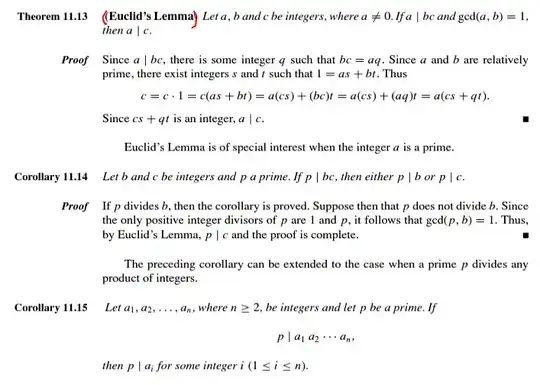Let $n, p \in \mathbb{Z}^{+}$ such that $p$ is prime. Prove $p \mid n^2 \Rightarrow p \mid n$.
What is a short or elegant proof to this? Some ideas are given at the question Prove that $\sqrt 5$ is irrational, but I would like to find a proof that does not need to rely upon the Unique Factorization Theorem or Euclid's Lemma, if possible. (In my particular math course, we haven't reached these results; they are yet to be proven and are inaccessible.)
I tried to start this proof by assuming $$\tag 1 p\mid ab\implies p\mid a \text{ or } p\mid b$$ The statement seems obviously true, however, my course requires a pedantic proof of that statement, and I am lost on finding one.
Euclid's Lemma (see snapshot at end) is given in a chapter of the textbook my class has not yet reached, so we may not assume this without proving it first. (But we may assume everything up to and including chapter 8 in this textbook(table of contents)). So I am trying to find a short proof for (1) $$p\mid ab\implies p\mid a \text{ or } p\mid b$$ that does not require Euclid's or Bezout's lemmas, if possible. If it is possible to show (1), then it seems proving $p | n^2 \Rightarrow p | n$ should be straightforward.
I was sketching out the following proof by $4$ cases.
Let $a, b, p, m, r_1, r_2 \in \mathbb{Z}$ where $p$ is prime. Prove: $$p\mid ab\implies p\mid a \text{ or } p\mid b$$ Assume $p\mid ab$. Then $ab = pm$ for some $m \in \mathbb{Z}^{+}$. (Note: Cases 1. and 2. are totally wrong, and so I may ask about this proof, $p\mid ab\implies p\mid a \text{ or } p\mid b$, in a new question.)
- $p \not \mid a \implies \cdots \implies \cdots \implies p \mid b$
- $p \not \mid b \implies \cdots \implies \cdots \implies p \mid a$
- $p \mid a$ and $p \mid b$. Done.
- $p \not \mid a$ and $p \not \mid b$. We must somehow show this leads to a contradiction. Not sure how to do this.
Euclid's Lemma
